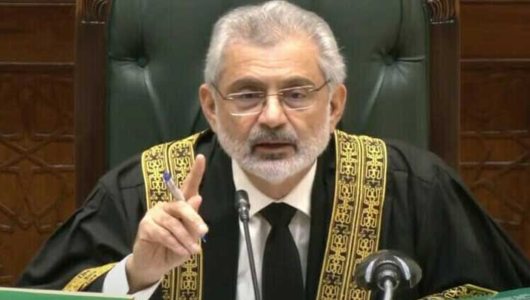ISLAMABAD: Chief Justice Qazi Faez Isa of Pakistan emphasized on Tuesday that, instead of following the United States’ examples, guidance should be drawn from the Quran.
This statement was made during the hearing of petitions challenging the Supreme Court (Practice and Procedure) Act 2023, a contentious law that restricts the authority of the CJP.
CJP Isa emphasized that Islam mandates seeking counsel from others before making decisions and directed PTI lawyer, Uzair Bhandari, to read the opening page of the Constitution during the proceedings. The lawyer pointed out that the Constitution’s first sentence states that the authority exercised by the people within Allah’s prescribed limits is “a sacred trust.” In response, CJP Isa questioned whether guidance could be drawn from the Holy Quran in this matter, citing Surah Aal-Imran’s guidance on consultation.
He further inquired about the potential harm in having the right to appeal. CJP Isa referred to Holy Prophet Muhammad’s practice of seeking consultation and highlighted that the parliament also emphasized decision-making through consultation rather than unilateral decisions by the chief justice.
A full court bench, led by CJP Isa and comprising 14 Supreme Court judges, resumed hearing the petitions. The proceedings were televised by state-run PTV News.
CJP Isa specified that the last day for hearing the petitions challenging the SC law, which restricts the powers of the country’s top judge, would be October 9, with proceedings to conclude by midnight. He expressed concern about the backlog of cases in the apex court.
CJP Isa clarified that the legislation in question doesn’t curtail the chief justice’s powers but distributes them among judges, particularly affecting the chief justice and the two senior-most judges.
The petitioner’s lawyer, Ikram Chaudhry, argued that parliament had encroached on the judiciary’s independence through the Practice Act. CJP Isa asked whether the arguments were based on newspaper reports and inquired whether the lawyer had requested the speaker in writing to provide records of parliament’s proceedings.
CJP Isa cautioned against political discussions in the court and emphasized the need to respect parliament. He mentioned the need to assess whether the law serves the people’s interests.
During the proceedings, the PTI lawyer, Uzair Bhandari, argued that rules take precedence over laws based on judicial precedents. Justice Minallah questioned whether laws or rules prevail, with the lawyer asserting that rules are constitutionally derived.
CJP Isa pointed out that Article 204 does not grant the right to appeal, but it was introduced through an ordinance. He defended the right to appeal, even in high-treason cases.
The CJP suggested that the political party should have debated this matter in parliament, to which the lawyer stated he was not responsible for the party’s decisions.
The case involves challenges to a law that deals with the powers of the top judge and seeks to limit suo moto powers. An eight-member bench of the Supreme Court had previously stayed the law’s implementation in April.
Under CJP Isa’s leadership, the case was set for hearing at the start of his tenure, and it marked the first time in Pakistan’s judicial history that the Supreme Court allowed live telecast of proceedings on such a contentious law.
The court directed lawyers to submit their responses by September 25 and adjourned the hearing until October 3. Additionally, CJP Isa formed a three-member committee to assign cases and form benches to ensure the Supreme Court’s functioning.
(Islamabad51_Newsdesk)














